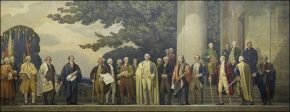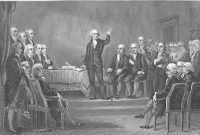The Ingenious Gouverneur Morris
“The true object of a great statesman,” Gouverneur Morris wrote to William Carmichael in Madrid in November 1792, “is to give to any particular nation the kind of laws which is suitable to them and the best constitution which they are capable of.” He wrote those words in Paris in the midst of the escalating chaos of the French Revolution; in less than two months, Louis XVI, America’s “great friend” to its own Revolution, would lose his head on the guillotine. The event would be no surprise to Morris, who had predicted the derailing of the Revolution within a very short time of his arrival in France in 1789, contrary to the sanguine outlook of Thomas Jefferson
Yet what sort of man was this revolutionary nay-sayer who had been, on the other side of the Atlantic, a significant actor in the American Revolutionary War effort and had played a vital role in the design of the American Constitution? J. Jackson Barlow has provided an excellent opportunity to get to know him better in his worthy new book, To Secure the Blessings of Liberty: Selected Writings of Gouverneur Morris.
Morris has long been dismissed as a “lightweight” (the comment of a former editor of the Papers of Thomas Jefferson), a producer of “solipsisms” (Jack Rakove) and “a flutterer upon the surface” (Richard Henry Lee, in 1780), but anyone who takes the time to delve into this collection will soon realize the injustice of those judgments. To give a bit of background for those unfamiliar with him: Morris (1752-1816) was born a member of the New York elite and trained as a lawyer. When the Revolutionary War came, Morris put his considerable financial and verbal talents at the service of the New York revolutionary government and later the Continental Congress, where he served on a multitude of committees and, by his own observation, did the vast majority of their work. In that capacity, he met George Washington and became one of his many devoted young protégés, along with Lafayette and Alexander Hamilton. Washington respected Morris, and would remain his loyal friend. Robert Morris, Superintendent of Finance during the war, also admired Gouverneur, hiring him as his assistant and, after the war, going into partnership with him.
Throughout the War, the Morrises had to contend with the deficiencies of the weak Confederation system, and Gouverneur was soon an advocate of a strong central government and executive. Although reluctant to take time from his business, these beliefs led him to attend the Constitutional Convention, where he was a major contributor, introducing significant proposals to strengthen the presidency, such as the veto, eligibility for re-election, and the failed effort to prescribe popular election of the President — though he managed to exchange election of the President by the Senate for the electoral college system as a better-than-nothing alternative. Morris also advocated an hereditary Senate as the best defense against an oligarchy, something he despised as much as what he called “mobocracy.” He opposed the “Great Compromise,” which he saw as a selling-out by the smaller states to the southern states to allow perpetuation of slavery in exchange for having an equal Senate vote; when he lost, he denounced the bargain in one of the greatest speeches of the Convention. In recognition of his mastery of language, he was assigned to write the preamble and to assemble and polish the final draft of the Constitution.
Morris went to France in the winter of 1788-89 on business. There he got to know Jefferson, soon to depart his post as American minister. Morris was introduced into the inner circle of revolutionary aristocrats, who were intrigued by the humorous one-legged American (he had lost a leg in a carriage accident in 1780). However, Morris’s consistently disapproving advice and bleak (and remarkably accurate) predictions about the likely course of the French Revolution led to an estrangement from many, including Lafayette and Jefferson. Others, including some of the king’s advisors, trusted Morris’s judgment and sought his advice.
In January 1792, at Washington’s behest, Morris was confirmed as Jefferson’s successor as minister to France. Even after his appointment, he assisted in abortive attempts in to help the royal family escape. During the Terror, his energies were dedicated to the often nearly impossible task of assisting Americans caught in the revolutionary chaos. Teddy Roosevelt has described Morris’s time as minister as a “feat which stands by itself in diplomatic history,” but in 1794, in response to complaints from the Committee of Public Safety, which believed (incorrectly) that Morris was sending damning reports about France back to the United States, the American government recalled Morris and replaced him with James Monroe.
Morris remained in Europe through 1798, working to free Lafayette from an Austrian prison, and on American land sales. After returning to America, he served from 1800-1803 as a replacement senator for New York and then returned to his ancestral estate in the Bronx, though he continued to express political opinions, privately and in print. He vehemently opposed the War of 1812, despising what he considered the naive diplomacy of Jefferson and Madison, and supported the secessionist Hartford Convention, though he readily abandoned it when peace was concluded with England. He long promoted the Erie Canal, serving as a commissioner for the project, and participated in the design of the efficient street grid of Manhattan.
Professor Barlow has chosen forty-five sets of documents, in chronological order with brief explanatory introductions, which track these episodes of Morris’s life and illustrate his sparkling intellect and extraordinary verbal gifts. The first is Morris’s youthful (1769) but astute critique of a New York colonial legislature proposal to institute paper money. The documents continue through an early speech on the “Necessity for Declaring Independence” to a stinging reply, on behalf of the Continental Congress, to the peace feelers of the Carlisle Commission; and on to his acute analysis of the reforms needed in the Congress for the war effort and establishing American financial stability. In this connection, the book includes a large number of letters on public finance published in a Pennsylvania paper. Even they are far from dry — for example:
The various opinions entertained, propagated and supported relative to your Paper Currency, differ so widely that they cannot all be right. Perhaps not one of them is strictly or entirely so. Unfortunately it happens on such occasions, and indeed on too many others, that mankind reason from their prejudices, their circumstances, and their interests. Thus in the most important affairs, like grown persons at the dancing school, we have much to unlearn, as well as to learn, before we can think and move with ease and grace. We must cast off our prejudices, rise above our circumstances, and divest ourselves of a pitiful regard to our interest whether pecuniary or political. Hard task, indeed!
Another early essay on the purpose of government gives a succinct delineation of Morris’s beliefs as he applied them to the New York constitution and then to that of the United States. Dismissing as unworkable the concept of “natural rights” so dear to many political philosophers, he turned instead to what he considered the meaningful rights: “political liberty” (the right to have a part in government) and “civil liberty” (the right to be left alone, including security in property). Civil liberty, in Morris’s view, was the most important because without it political liberty would not survive; and obtaining a workable balance was the principal goal of government design. These views are reflected in many of the documents in this book, as well as in the notes of Morris’s speeches in the debates of the Constitutional Convention (not in the book but well worth reviewing with an eye to Morris).
They are repeated in another document in the book, his observations on the unworkable (and quickly abandoned) French Constitution of 1791, which he called “ridiculous” in his diary. His skeptical reports to Washington made the President leery of sending a message of congratulation to the French about the new document. (This drove the pro-Revolution Jefferson into a rage in which he described Morris as a “high-flying Monarchy-man, shutting his eyes and his faith to every fact against his wishes, and believing every thing he desires to be true.”)
Readers of the Federalist Papers could benefit from a side dose of the (often far more readable!) essays in this book, penned by the eminently realistic but also humane Morris. While they read them, however, they might keep in mind a comment in a letter to Timothy Pickering in 1814:
But, after all, what does it signify, that men should have a written Constitution containing unequivocal provisions and limitations? The legislative lion will not be entangled in the meshes of a logical net. The legislature will always make the power which it wishes to exercise, unless it be so organized as to contain within itself the sufficient check. Attempts to restrain it from outrage by other means will only render it more outrageous. The idea of binding legislators by oaths is puerile. Having sworn to exercise the powers granted, according to their true intent and meaning, they will, when they feel a desire to go farther, avoid the shame if not the guilt of perjury by swearing the true intent and meaning to be according to their comprehension that which suits their purpose.
Morris was no straight-line party man. Professor Barlow’s book contains two greatly-admired speeches Morris gave in Congress opposing the Republican repeal of the Judiciary Act of 1801; yet there are also letters to the newspapers supporting the Louisiana Purchase, to the consternation of his Federalist friends. In another selection, with a very different import, Morris attacked the Jefferson administration for rejecting the 1806 treaty with the British that had been negotiated by William Pinckney and James Monroe. Here Morris made clear his belief that the Republican president was leading the country into disaster. He described Jefferson as “more deficient in politics than in any other [science]:
If any gentleman assume as a principle that mankind can be governed by reason, and insist, notwithstanding the evidence of all history, ancient and modern, sacred and profane, that we may prudently rely on reason for the defense of nations, we would advise him to commence a course of experiments with his own family, and see how far reason will go there.
In sum: it was a pleasure to read through the stimulating selections in this book. As the editor of a project to re-transcribe and publish a modern annotated edition of the considerable corpus of Morris’s writings (at the moment, working on his remarkable diaries) I would add a note concerning transcriptions made and published by Jared Sparks (1836) and Anne Cary Morris (1888) using handwritten originals — Morris’s diaries, letters, and other document drafts, as opposed to the items reprinted from printed materials (which constitute the majority of Dr. Barlow’s book, and he notes that he compared and corrected his selections using manuscript versions.) The nineteenth-century compilations should be read with the knowledge that Sparks felt free to throw in a multitude of commas and other grammatical changes (and omissions) that impair the beauty of Morris’s lucid eloquence and can also obscure the meaning. Anne Morris often — and without any indication — dropped large blocks of material in mid-text. Fortunately, Professor Barlow has clearly labored to provide the best versions currently available of the documents he chose, including making some recent transcriptions.
Morris was never dull, as these selections attest, and as many of his peers knew — Guillaume Otto, a French consul at New York, described Morris as “perhaps the most eloquent & ingenious man of his country” and Washington probably would have agreed with him. Nor, as these materials amply demonstrate, was Morris a “lightweight.” Much of what he had to say two hundred years ago of politics and human beings is still fresh and apt today, worthy of study and enjoyment, and Professor Barlow’s fine selections do this under-appreciated Founding Father justice.


